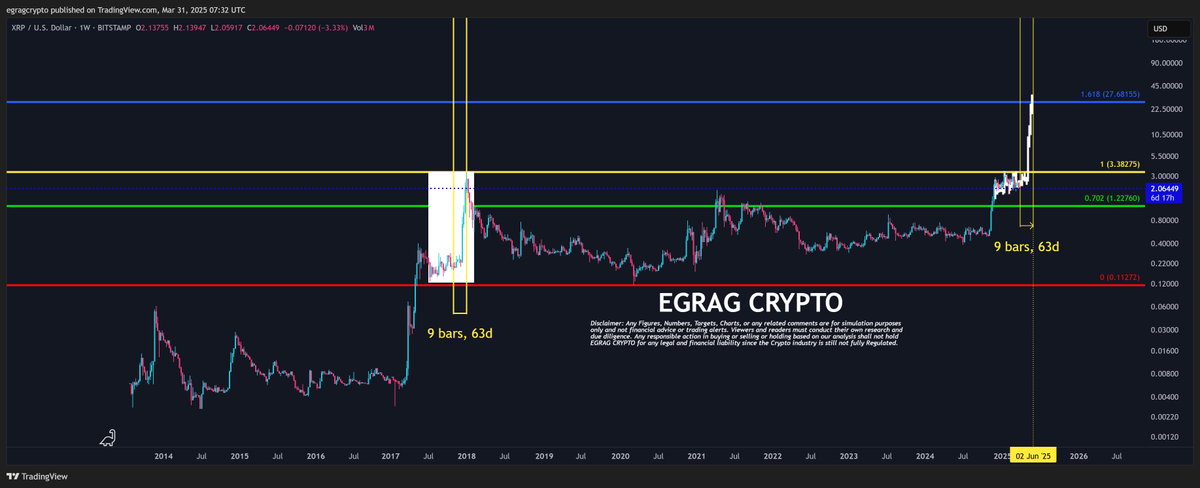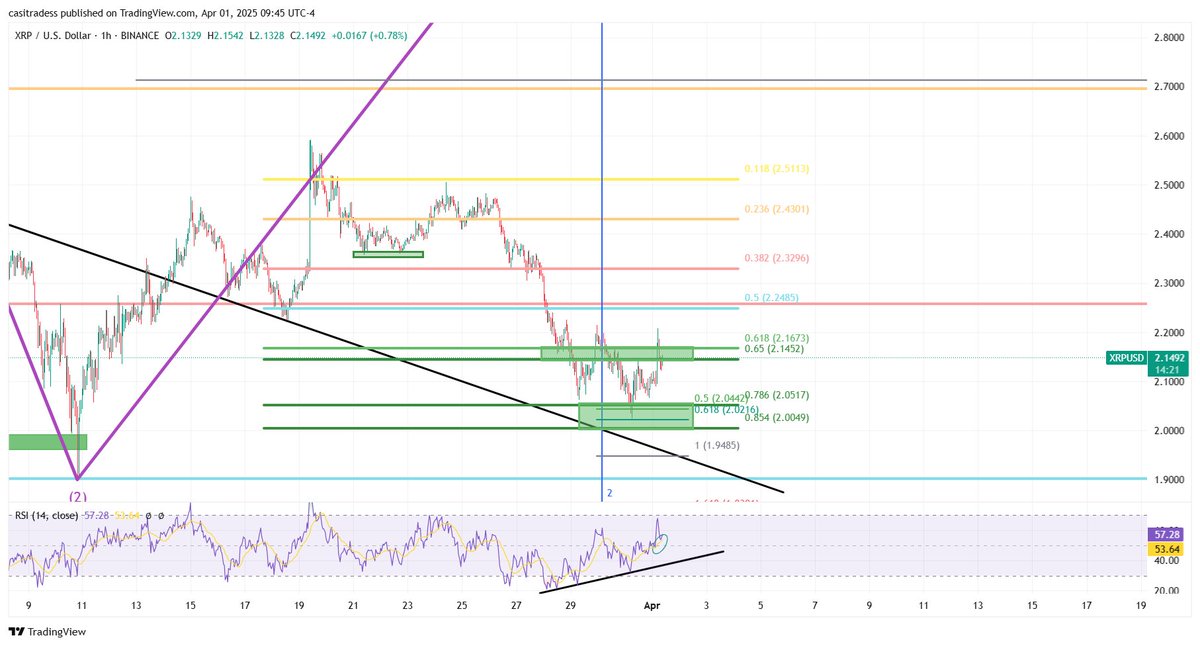Altcoin
Ethereum ETF, FOMC Minutes, US Job Data & Trade Deficit

The crypto market is bracing for a week filled with significant events and data releases that could sway investor sentiment and market movements. Key highlights include the delay in the launch of Spot Ethereum ETFs, the implementation of the European Union’s MiCA regulation.
Moreover, the market also braces for the release of the Federal Reserve’s June meeting minutes. In addition, the week will see U.S. job data, and trade deficit figures. Each of these events holds the potential to impact the volatile crypto market, making it crucial for investors to stay informed.
Ethereum ETF Launch Delayed
The anticipated launch of Spot Ethereum ETFs has been delayed once again by the U.S. Securities and Exchange Commission (SEC). Analysts such as Bloomberg’s Eric Balchunas and James Seyffart had estimated around July 2. However, the SEC issued additional comments on the S-1 forms submitted by the issuers.
The SEC has now requested that the forms be resubmitted by July 8, pushing the potential launch date to mid or late July. Earlier, SEC Chair Gary Gensler confirmed that the Ethereum ETF approval process is progressing smoothly for all issuers. While the delay leaves the Ethereum market in FUD, ETFstore President Nate Geraci noted that the revisions were light.
He suggested that trading could commence within 14-21 days after resubmission. This delay adds uncertainty to the market, but a successful launch could provide a significant boost to the Ethereum price and overall market sentiment. Hence, this week could see S-1 amendments by BlackRock, VanEck, Grayscale, 21Shares, Fidelity, and other issuers.
MiCA Crypto Rules Implementation In EU
On June 30, the European Union’s Markets in Crypto Assets Regulation (MiCA) is set to take effect. It will introduce one of the first comprehensive regulatory frameworks for crypto trading in a major financial market. However, recent study by Acuiti and Eventus reveals that 91% of affected firms are not prepared for MiCA’s requirements.
Hence, this regulatory implementation is expected to reshape the industry. This emphasizes the urgent need for companies to accelerate their compliance efforts. Therefore, crypto firms that fail to adapt could face significant operational and financial consequences.
It could potentially lead to market disruptions and volatility in the short term. However, in the long run, MiCA aims to enhance market stability and investor protection, which could foster greater institutional participation in the crypto market.
Also Read: US SEC Delays Spot Ethereum ETF Launch, Sends Back S-1 Forms
FOMC June Meeting Minutes
On July 3, the Federal Reserve will release the minutes from its June Federal Open Market Committee (FOMC) meeting at 2 p.m. ET. Moreover, the minutes will provide insights into the Fed’s decision-making process, particularly regarding interest rates. Furthermore, a rate pause is expected to continue as Fed Governor Michelle Bowman indicated that rate cuts are unlikely before 2025 despite recent cooling inflation data.
Any hints of a hawkish stance could weigh on the crypto market, as higher interest rates typically reduce the appeal of riskier assets like cryptocurrencies. On the flip side, indications of prolonged rate stability or dovish sentiment could support market sentiment and crypto prices.
U.S. Job Data For May & June
The U.S. labor market data will be closely watched this week. It will see multiple releases providing a comprehensive view of employment trends:
1. Job Openings Data (July 2): The May data, with an estimate of 7.860 million job openings, follows April’s 8.059 million. A higher-than-expected figure could indicate a robust labor market, potentially leading to concerns about inflationary pressures and more hawkish Fed policies, which could negatively impact the crypto market. Conversely, a lower figure might alleviate these concerns, supporting crypto prices.
2. Employment Report (July 5): The June employment report is forecasted to show 195,000 new jobs, down from May’s 272,000. A higher number could signal economic strength but may also raise inflation worries, while a lower number could dampen economic growth prospects, affecting market sentiment.
3. Unemployment Rate (July 5): Expected to remain steady at 4.0%. Any deviation could influence market perceptions of economic stability and future Fed policy actions.
4. Hourly Wages (July 5): Forecasted to rise by 0.3% in June, down from 0.4% in May. Year-over-year wage growth will also be monitored. Higher wage growth could stoke inflation fears, impacting Fed decisions and market dynamics, including crypto.
U.S. Trade Deficit Data Impact On Crypto
On July 3, the U.S. trade deficit data for May will be released. April saw an 8.7% increase to $74.6 billion. A widening deficit could signal economic challenges and potentially deter investment in high-risk assets like cryptocurrencies. Conversely, a narrowing deficit might boost investor confidence and positively impact the crypto market.
Fed Chair Jereme Powell’s Speech In Portugal
Federal Reserve Chair Jerome Powell and other key Fed officials are scheduled to participate in significant discussions at the European Central Bank Forum on Central Banking in Sintra, Portugal. In addition, an event will be conducted in India. On July 2, Powell will join a policy panel at the ECB Forum.
The panel will focus on monetary policy in an era of transformation. Moreover, this panel is expected to address pressing issues like inflation trends and the economic impacts of geopolitical shocks. The same day, ECB board members will chair sessions on inflation in the euro area and the economics of biodiversity.
On July 3, the forum will feature remarks from ECB President Christine Lagarde, and a panel discussion on the drivers of equilibrium interest rates. It will also include John Williams, President of the Federal Reserve Bank of New York.
Following these events, John Williams will deliver a speech in India on July 5 at 5:30 a.m. ET. Previously, he has indicated that he sees no urgency for rate cuts in the near term despite cooling inflation data. These speeches and discussions will offer critical insights into the Fed’s outlook on inflation, interest rates, and global economic trends.
Also Read: Bitcoin Price To $65k Or $55k After US PCE Data? IMF Asks Fed To Delay Rate Cuts
The presented content may include the personal opinion of the author and is subject to market condition. Do your market research before investing in cryptocurrencies. The author or the publication does not hold any responsibility for your personal financial loss.
Altcoin
XRP Price to $27? Expert Predicts Exact Timeline for the Next Massive Surge

Crypto expert Egrag Crypto has again predicted that the XRP price could rally to as high as $27. The analyst has also revealed the exact timeline for when the altcoin could record this massive price surge.
Expert Reveals Time For XRP Price To Hit $27
In an X post, Egrag Crypto asserted that the XRP price can hit $27 in 60 days. The expert remarked that historical patterns indicate that the altcoin can reach this target within this timeframe.
Based on this price prediction, XRP could reach this $27 target by June, marking a 1,250% gain for Ripple’s native crypto. The expert’s accompanying chart showed that he was alluding to the 2017 bull run as to why the altcoin could record such a parabolic rally.
In 2017, XRP recorded a historic gain of over 60,000% as it rallied to its current all-time high (ATH) of $3.8 the following year. As such, based on history, a 1,250% increase is nothing for the altcoin.
In the meantime, the XRP price still boasts a bearish outlook thanks to the sentiment in the broader crypto market. As CoinGape reported, Ripple’s coin could drop to the next major support levels at $1.79 and $1.56 if it fails to hold above $2.03.
Decision Time For The Altcoin
In an X post, crypto analyst CasiTrades stated that it is decision time for the XRP price. She noted that the altcoin is showing strength with a bounce right back to the first key test at $2.17. She added that this is the resistance level she wants to see flip into support, as it might be the “most important price of the week.”
The analyst stated that XRP must reclaim this level to build momentum. She added that the $2 level remains a valid target if the $2.17 level rejects. Meanwhile, CasiTrades revealed that $2.70, $3.05, and $3.80 are the major resistance zones once the upward trend is confirmed.
The analyst also mentioned that the XRP price is now fully inside the Fibonacci Time Zone 3, which spans most of April. She affirmed that this is the breakout window market participants have been preparing for and that all signs point to a macro wave.
CasiTrades affirmed that the structure is clean. The RSI divergence has confirmed the bottom, while the subwaves are aligning well with the larger targets. If the next leg pushes XRP back above $2.17 with momentum, she claimed that market participants may finally see obvious signs of Wave 3. Interestingly, the analyst added that if the altcoin clears $2.70 this week, it may break the $1,000 price extension.
For now, investors may remain cautious, especially seeing how XRP fell after the PMI and JOLTS data release earlier today. Donald Trump is also set to announce reciprocal tariffs tomorrow, which could spark a massive price crash.
Disclaimer: The presented content may include the personal opinion of the author and is subject to market condition. Do your market research before investing in cryptocurrencies. The author or the publication does not hold any responsibility for your personal financial loss.
Altcoin
Binance Update Sparks 50% Decline For Solana Meme Coin ACT: Details

A recent Binance update has triggered massive liquidations while sending Solana memecoin ACT into a steep correction. At first, pundits blamed market maker Wintermute for the jarring declines but Binance’s update to leverage and margin tiers appears to be the culprit.
Several Altcoins on Binance Suffer Massive Corrections
According to an X post, several altcoins listed on Binance took a major hit, dropping by double-digit percentages. The hardest hit of the lot was Solana memecoin ACT, experiencing a sudden drop of over 50% in 30 minutes.
Other altcoins including DEXE and DF equally recorded steep declines of 23% and 16% respectively in the same window. The price slump left traders scratching their heads but a consensus formed that sizable sell orders were behind the declines.


“The sudden dips were triggered by large sell orders executed in a short time frame, leading to a significant surge in spot trading volume,” said one pundit.
Others turned to market maker Wintermute as the trigger for the selloff. However, Wintermute CEO Evgeny Gaevoy denied responsibility while noting that the market maker reacted “post move.”
The decline comes amid a broader market recovery with several cryptocurrencies including Compound (COMP) gaining 70%.
What Triggered The 50% Decline For Solana Meme Coin
A Binance update on leverage and margin tiers on specific tokens like ACT triggered the massive declines. According to an April 1 announcement, the top exchange has updated the margin tiers of several perpetual contracts, noting that existing positions will be affected.
Following the move, one ACT whale got liquidated for $3.79 million at $0.1877, triggering a broad selloff. Former FTX community manager Benson Sun noted that traders had less than 3 hours to respond to the change, criticizing Binance for the move.
“Before changing the rules, Binance should have evaluated how many positions would be closed,” said Sun. “If there are market makers with large positions, they should have notified them in advance.”
Within hours of MUBARAK’s listing, the memecoin tumbled by 40% with Binance CEO Changpeng Zhao downplaying the impact of a listing on prices. Binance has drawn criticism in recent days following its exclusion of Pi Network from its Vote To List initiative.
Disclaimer: The presented content may include the personal opinion of the author and is subject to market condition. Do your market research before investing in cryptocurrencies. The author or the publication does not hold any responsibility for your personal financial loss.
Altcoin
BTC, ETH, XRP, DOGE Fall Following Weak PMI, JOLTS Data

A crypto market crash looks imminent, with Bitcoin, Ethereum, XRP, and Dogecoin witnessing notable declines. This price crash happened following the release of weak manufacturing PMI and JOLTS data, which provides a bearish outlook for the market.
Crypto Market Crash: BTC, ETH, XRP, & DOGE Decline
CoinMarketCap data shows that a crypto market crash could be on the horizon, with the Bitcoin price sharply dropping below $83,000 from a daily high of around $84,400. Altcoins such as Ethereum, XRP, and DOGE also witnessed sharp declines.
This market crash occurred following the release of weak ISM manufacturing PMI and JOLTS data. The March PMI data dropped to 49, below expectations of 49.5 and lower than the 50 recorded in February.
The US JOLTS job openings for February came in at 7.568 million, below the expected 7.690 million and lower than the 7.762 million recorded in January. These data add to several macro fundamentals that paint a bearish outlook for the market.
This crypto market crash could persist, with China, Japan, and South Korea agreeing to respond to Donald Trump’s proposed tariffs. Trump is set to announce a number of reciprocal tariffs tomorrow, which could significantly harm the market as it sets off a trade war between the US and other nations.
Disclaimer: The presented content may include the personal opinion of the author and is subject to market condition. Do your market research before investing in cryptocurrencies. The author or the publication does not hold any responsibility for your personal financial loss.
-

 Ethereum23 hours ago
Ethereum23 hours agoEthereum May Have To Undo This Death Cross For Bull’s Return
-

 Market23 hours ago
Market23 hours agoBlackRock’s Larry Fink Thinks Crypto Could Harm The Dollar
-

 Market22 hours ago
Market22 hours agoCoinbase Tries to Resume Lawsuit Against the FDIC
-

 Altcoin22 hours ago
Altcoin22 hours agoCharles Hoskinson Reveals How Cardano Will Boost Bitcoin’s Adoption
-

 Market21 hours ago
Market21 hours agoHedera (HBAR) Bears Dominate, HBAR Eyes Key $0.15 Level
-

 Market19 hours ago
Market19 hours agoCardano (ADA) Whales Hit 2-Year Low as Key Support Retested
-

 Market24 hours ago
Market24 hours agoXRP Bears Lead, But Bulls Protect Key Price Zone
-

 Altcoin23 hours ago
Altcoin23 hours agoEthereum Bitcoin Ratio Drops to Record Low, What Next for ETH?




















✓ Share: